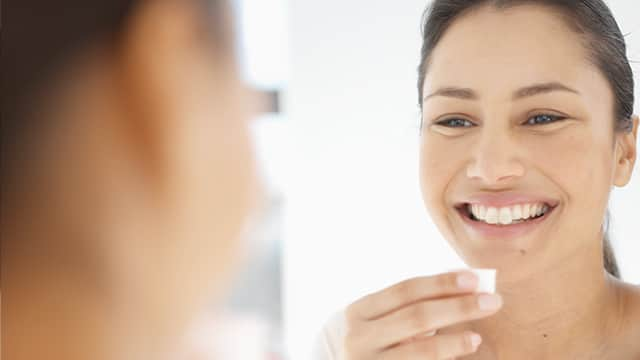How does Whitening Mouthwash Work?
Whitening mouthwash contains a bleaching agent to help remove stains and brighten your teeth. The most commonly used bleaching agent is hydrogen peroxide, which penetrates the surface of your teeth and breaks down the pigments responsible for tooth staining. This works especially well on stains that have built up because of lifestyle factors, like drinking coffee or red wine, or smoking cigarettes.
How to Use a Whitening Mouthwash
For a whitening mouthwash to be effective, you need to make it a consistent part of your oral care routine. A study in the Scientific World Journal showed that hydrogen peroxide mouthwashes increased teeth whiteness over time but found no significant color changes in the first 56 days. To get the most out of your whitening mouthwash, follow the instructions on the back of the bottle, and commit to using it long-term. Most products will require you to swish the solution around your mouth for 60 seconds twice a day. Remember not to swallow!
How to Choose the Best Mouthwash for Whitening
The best whitening mouthwash will include ingredients that do more than whiten your teeth. You might know that plaque and tartar are responsible for a number of oral health problems, such as tooth decay and gum disease, but these nasty substances also attract stains and discolor your teeth. A mouthwash that prevents them from building up goes a long way towards a brighter and healthier smile. Look for added anti-plaque and anti-tartar ingredients like cetylpyridinium chloride or pyrophosphates. Fluoride helps to fight plaque too, and it also keeps your enamel strong and healthy.
Some whitening mouthwashes contain alcohol, but this ingredient can dry out your mouth and kill the good bacteria that keeps it healthy. Look for an alcohol-free option like Colgate® Optic White® Whitening Mouthwash, which fights the bad bacteria while protecting the good.
How to Get the Best Teeth Whitening Results
Whitening mouthwash works best when combined with other at-home and professional teeth whitening treatments, according to Restorative Dentistry & Endodontics. Most whitening mouthwashes contain a 2% concentration of hydrogen peroxide. In comparison, the bleaching products used by your dentist contain 25-40%. The Scientific World Journal study found that even at-home whitening gels with 10% carbamide peroxide worked better than mouthwash to whiten teeth when the gel was applied directly to the tooth. Other whitening techniques include toothpaste, whitening strips, over-the-counter gels, take-home trays, and professional whitening treatments.
Frequently Asked Questions About Whitening Mouthwashes
Are there any side effects or risks associated with using whitening mouthwashes?
Whitening mouthwashes are safe. However, some ingredients can cause mild side effects in some people. For example, a whitening mouthwash that contains alcohol can worsen symptoms of dry mouth (xerostomia), so an alcohol-free mouthwash like Colgate® Optic White® Whitening Mouthwash may be more suitable. Some people may be sensitive to hydrogen peroxide or other bleaching agents and may experience tooth sensitivity and/or gum irritation when using a whitening mouthwash. If this happens, speak to your dental professional for advice.
Can whitening mouthwashes be used daily?
Whitening mouthwashes can be used every day, and some can be used twice a day. It’s best to check the instructions on your mouthwash, as this differs from product to product.
What is the difference between over-the-counter whitening mouthwashes and those prescribed by a dentist?
There is a limit to how much bleaching agent, e.g. hydrogen peroxide, an over-the-counter product can contain. Dental professionals can prescribe stronger products than this, so a whitening mouthwash prescribed by your dentist may contain more hydrogen peroxide. A mouthwash given to you by your dentist might also contain therapeutic ingredients for other oral health concerns, such as gum disease.
Do whitening mouthwashes affect tooth enamel?
Very high concentrations of bleaching agents like hydrogen peroxide can cause potentially harmful changes in your tooth enamel. However, the amounts contained in a whitening mouthwash are considered safe and will not harm your enamel. Always follow the recommended usage instructions for whitening mouthwashes and other whitening products to keep your enamel healthy and strong.
Are whitening mouthwashes suitable for everyone?
Talk to your dental professional about the best way to improve the color of your teeth. Your dentist or dental hygienist can determine if you are a good candidate for whitening treatments and recommend the best whitening technique for your situation.
Remember that even the best whitening mouthwashes and mouthrinses do not replace regular brushing and flossing. Protecting your teeth from cavities and decay is the first and most important step to a more beautiful smile. Explore how a whitening mouthwash can accompany your oral care routine and other whitening products to help your pearly whites shine.
This article is intended to promote understanding of and knowledge about general oral health topics. It is not intended to be a substitute for professional advice, diagnosis or treatment. Always seek the advice of your dentist or other qualified healthcare provider with any questions you may have regarding a medical condition or treatment.
ORAL HEALTH QUIZ
What's behind your smile?
Take our Oral Health assessment to get the most from your oral care routine
ORAL HEALTH QUIZ
What's behind your smile?
Take our Oral Health assessment to get the most from your oral care routine
Join Us
Get the best of your oral health routine and take it to the next level with expert advice, recommendations, products and solutions and special offers.
Join Us
Get the best of your oral health routine and take it to the next level with expert advice, recommendations, products and solutions and special offers.















